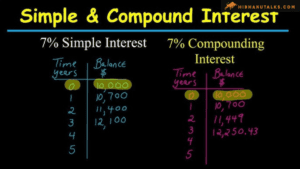
Understanding the Different Types of Mutual Funds: A Complete Overview for Investors
Contents
- 1 Types of mutual funds
- 1.1 Understanding the Different Types of Mutual Funds: A Complete Overview for Investors
- 1.1.1 What is a Mutual Fund?
- 1.1.2 Types of Mutual Funds
- 1.1.2.1 1. Equity Mutual Funds: High Growth Potential
- 1.1.2.2 2. Debt Mutual Funds: Stability and Regular Income
- 1.1.2.3 3. Hybrid Mutual Funds: A Balanced Approach
- 1.1.2.4 4. Index Funds: Simple and Low-Cost
- 1.1.2.5 5. Sector Mutual Funds: Industry-Specific Focus
- 1.1.2.6 6. International Mutual Funds: Global Opportunities
- 1.1.2.7 7. Exchange-Traded Funds (ETFs): Flexibility with Stocks
- 1.1.2.8 8. Fund of Funds: Diversification at Its Best
- 1.1.3 Key Considerations When Choosing a Mutual Fund:
- 1.1.4 Conclusion:
- 1.1.5 FAQs:
- 1.1.5.1 1.What is a mutual fund?
- 1.1.5.2 2.What are the main types of mutual funds?
- 1.1.5.3 3.How do I choose the best mutual fund for me?
- 1.1.5.4 4.Are mutual funds risky?
- 1.1.5.5 5.What is the difference between actively and passively managed funds?
- 1.1.5.6 6.Can I lose money in a mutual fund?
- 1.1.5.7 7.What is the minimum investment in mutual funds?
- 1.1.5.8 8.How are mutual funds taxed?
- 1.1.5.9 9.Can I invest in international mutual funds?
- 1.1.5.10 10.What are the costs associated with mutual funds?
- 1.2 Types of mutual funds
- 1.3 Understanding the Basics of Mutual Funds
- 1.4 NTPC Green Energy IPO: Key Takeaways, NTPC Share Price Target, and Stock Forecast
- 1.1 Understanding the Different Types of Mutual Funds: A Complete Overview for Investors
Types of mutual funds
Understanding the Different Types of Mutual Funds: A Complete Overview for Investors
What is a Mutual Fund?
A mutual fund is a type of investment vehicle that pools money from multiple investors to invest in a diversified portfolio of stocks, bonds, or other securities. These funds are managed by professional fund managers who make investment decisions on behalf of the investors. Mutual funds are designed to offer small investors access to professionally managed portfolios at a relatively low cost.


Types of Mutual Funds
1. Equity Mutual Funds: High Growth Potential
Equity mutual funds invest primarily in stocks, which means they offer the potential for high returns. These are ideal for investors who are willing to take on more risk for the chance of greater rewards.
Types of Equity Funds:
- Large-cap funds: Invest in companies with large market capitalizations.
- Mid-cap funds: Focus on medium-sized companies.
- Small-cap funds: Invest in smaller companies with high growth potential but increased risk.
Key Benefits:
- High potential for growth
- Diversification across sectors
2. Debt Mutual Funds: Stability and Regular Income
Debt mutual funds invest in bonds and other fixed-income securities. They are ideal for conservative investors looking for steady income with less risk compared to equity funds.
Types of Debt Funds:
- Liquid funds: Suitable for short-term needs, invest in short-term debt instruments.
- Income funds: Long-term investments focused on bonds.
- Gilt funds: Invest in government securities.
Key Benefits:
- Lower risk
- Regular income from interest payments


3. Hybrid Mutual Funds: A Balanced Approach
Hybrid mutual funds combine both equity and debt in a single portfolio. These funds are designed to offer a balanced risk-reward ratio.
Types of Hybrid Funds:
- Aggressive hybrid funds: Higher allocation to equity.
- Conservative hybrid funds: Higher allocation to debt.
- Balanced hybrid funds: Equal allocation between equity and debt.
Key Benefits:
- Diversified investment
- Balanced risk and return
4. Index Funds: Simple and Low-Cost
Index funds track a specific index, such as the S&P 500, and are passively managed. They are popular due to their low cost and simplicity.
Key Benefits:
- Low management fees
- Broad market exposure
5. Sector Mutual Funds: Industry-Specific Focus
Sector mutual funds invest in stocks from a specific industry or sector, such as technology, healthcare, or energy.
Key Benefits:
- High potential returns if the sector performs well
- Focused exposure to booming industries
6. International Mutual Funds: Global Opportunities
These funds invest in international markets, providing exposure to global companies and industries.
Key Benefits:
- Geographic diversification
- Access to foreign companies and markets


7. Exchange-Traded Funds (ETFs): Flexibility with Stocks
ETFs are traded like stocks on an exchange but behave similarly to mutual funds. They offer the flexibility of stock trading with the diversification of mutual funds.
Key Benefits:
- Traded like stocks
- Typically lower fees than traditional mutual funds
8. Fund of Funds: Diversification at Its Best
Fund of funds (FoFs) invest in other mutual funds rather than directly in securities, providing a highly diversified portfolio in a single investment.
Key Benefits:
- Simplified diversification
- Access to multiple fund strategies
Key Considerations When Choosing a Mutual Fund:
- Risk Tolerance: Higher returns usually come with higher risk. Be clear about how much risk you can afford.
- Investment Horizon: Equity funds are better for long-term goals, while debt funds can serve short-term objectives.
- Financial Goals: Align your mutual fund choices with your financial goals, whether it’s wealth creation, income generation, or retirement planning.
Conclusion:
Mutual funds offer a world of opportunities for every type of investor, from risk-takers to those who prefer safety. By understanding the different types of mutual funds, you can tailor your investment portfolio to your unique goals and risk tolerance. Whether you want growth, income, or a mix of both, there’s a mutual fund that fits your needs. As with any investment, it’s essential to do your homework and consult with a financial advisor to ensure you’re making the best decisions for your financial future.
FAQs:
1.What is a mutual fund?
A. A mutual fund pools money from multiple investors to invest in securities like stocks, bonds, and other assets.
2.What are the main types of mutual funds?
A. The main types are equity, debt, hybrid, index funds, and sector funds.
3.How do I choose the best mutual fund for me?
A. Consider your risk tolerance, investment horizon, and financial goals when selecting a mutual fund.
4.Are mutual funds risky?
A. The risk varies depending on the type of mutual fund, with equity funds being riskier and debt funds being more stable.
5.What is the difference between actively and passively managed funds?
A. Actively managed funds involve fund managers making decisions to beat the market, while passive funds, like index funds, track market indices.
6.Can I lose money in a mutual fund?
A. Yes, especially in equity mutual funds, there’s a risk of losing money due to market volatility.
7.What is the minimum investment in mutual funds?
A. The minimum varies but can start as low as $500 or even lower in some cases.
8.How are mutual funds taxed?
A. Taxes depend on the type of fund and holding period. Short-term gains are usually taxed at higher rates.
9.Can I invest in international mutual funds?
A. Yes, international mutual funds offer exposure to foreign markets and companies.
10.What are the costs associated with mutual funds?
A. Mutual funds may have management fees, expense ratios, and sometimes load fees for buying or selling shares.
Types of mutual funds
Understanding the Basics of Mutual Funds





















2 comments